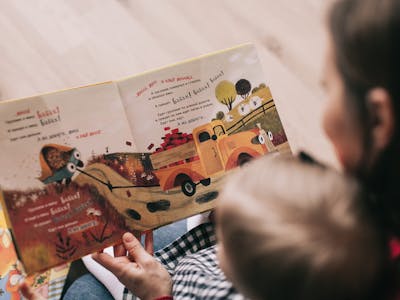Children are incredible little cognitive powerhouses: constantly growing, learning, observing, soaking in their environments like sponges. It is no secret that starting educational processes young gives children a major leg up. Among the fundamental pillars of learning and mental development, reading is arguably the most important of all.
The written word, whether bonded over with a parent, or independently enjoyed, is so vital to a burgeoning mind’s ability to master language, to put thoughts and images into words, to communicate with fluidity and grace, and to understand the perspective, feelings, and thought-processes of others.
Reading Helps Children Become Well-Rounded

The experts all agree–reading is absolutely vital to a well-rounded childhood, and leads to better academic outcomes down the road in nearly every measurable category. Even something as simple as having a book-filled home is a statistically significant factor in predicting how well a child will perform later in school.
This is a broad topic, and the benefits of reading are too numerous to cover in a short article, but we will endeavor to name a few that we believe to be key.
First and foremost, reading increases general knowledge of the world. This is particularly special for young children, as so many crucial concepts make first-contact through the power of storytelling and narrative. This applies not only to concepts, of course, but to the vocabulary itself. A new word often needs to be read several times before it sticks in the memory, and children who read are shown to have a massive advantage when it comes to their repertoire of words.
Analytical Thinking Also Benefits

Whole papers have been written on reading’s benefits to analytical thinking, and the act itself is also known to improve focus and attention span in young children. These benefits translate, rather directly, into improved performance in almost every aspect of a typical school curriculum.
Looking further down the road, many of the literary and verbal skills honed through reading are not only a huge part of standardized testing, but of almost every endeavor your child will face as they navigate the higher levels of our education system.
Unfortunately, it has recently been shown that many children arrive at school woefully unprepared for the literary demands that studying and reading classes will place on them. How do we, as parents, deal with this sobering fact?
Trying To Maintain Reading Discipline, Despite Distractions

The natural impulse is to give a child as many advantages as possible, and reading from a young age is a simple and inexpensive way to do just that. Sometimes though, this can be more easily said than done. Instilling a lifelong love of reading–truly motivating a child to fall in love with the language–can be challenging in a world full of dazzling, shiny technology constantly vying for their child-sized reservoirs of attention.
We find personalized books, containing various stories for kids, to be a great way to catch that famously fluid attention span of the very young reader. Hook them on the written word while they are young, the thinking goes, and you set them up for a lifelong reading habit that will stand them in good intellectual stead.
Tailor made, bespoke reading experiences are a great way to accomplish this. After all, what could engage a child in reading more than a story in which she is the hero?
Start Reading With A Child and Give The Gift of Knowledge
We believe reading shouldn’t be a chore. It shouldn’t be about dusty, irrelevant tomes far disconnected from a child’s own experience. It should be about the child themselves.
Through shifting the focus of reading, and making it a more personalized and emotionally rewarding experience, we hope to help parents across the world kindle a flame inside of their children that will grow into a burning passion for books and language, setting them up for success in a world that demands ever increasing levels of literacy.
Want more great parenting content? Check our free eBook on parenting in the digital age.
